Venezuela rocked by killing of beauty queen Monica Spear
- Published
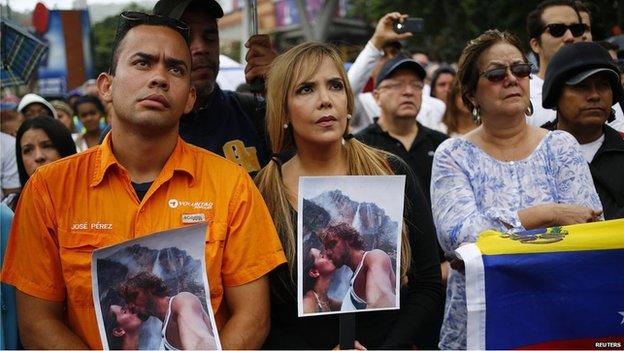
Ms Spear's death has sparked demonstrations and calls for an end to violence
The murder of former beauty queen and soap opera actress Monica Spear has moved Venezuelans in an unprecedented way.
As soon as news of the murder became public, the hashtag #NoMasViolenciaVenezuela (No more violence Venezuela) started trending on social media, while politicians held emergency meetings.
President Nicolas Maduro met governors and mayors from around the country, and even shook hands with his opposition leader Henrique Capriles.
But Ms Spear's death is not uncommon in a country that has the fifth highest murder rate in the world, according to the United Nations Office on Drugs and Crime, external (UNODC).
The Venezuelan Violence Observatory (OVV), which collates data collected by seven universities in Venezuela, says murder figures are even higher.
According to the NGO, there were 24,763 murders in Venezuela in 2013, making its homicide rate 79 per 100,000 inhabitants - much higher than the 49 per 100,000 reported by the UNODC in 2011.
Analysts say many of the murders are committed with the large number of illegal weapons in circulation.
Official numbers are not available, but different analyses place them between five and 13 million - a high concentration for a country of 29 million inhabitants.
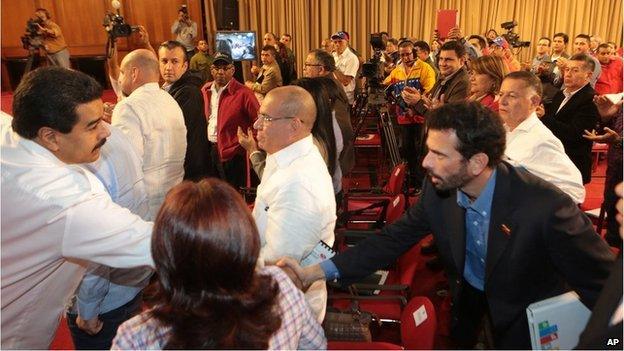
Ms Spear's death has spurred on politicians on both sides of the political divide to work together
Living in fear
On a daily basis, the high murder rates have led many Venezuelans, especially in Caracas, to change the way they live, if they can.
"Among friends, we prefer meeting up in our houses to avoid exposing ourselves to risk," says 30-year-old Sanmy Subero.
"I don't go out much to party because it is dangerous. If I go out at night it's because I know where I'm going and who I am going with."
It is rare to see people in the streets of Caracas after 21:00.
Evening classes in many universities have been cancelled over the past years. Several bars and clubs are located in malls, where revellers can call licensed cabs more easily without having to wait by the roadside.
"People are afraid," says Mr Subero. "Unfortunately it has become common to say: 'I was robbed but thank God they didn't do anything to me.'"
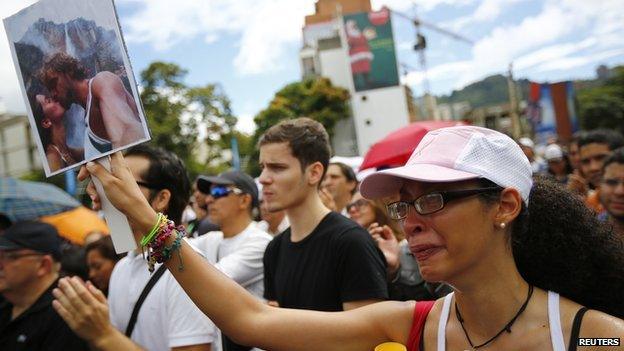
Ms Spear's death has highlighted the high murder rate in Venezuela
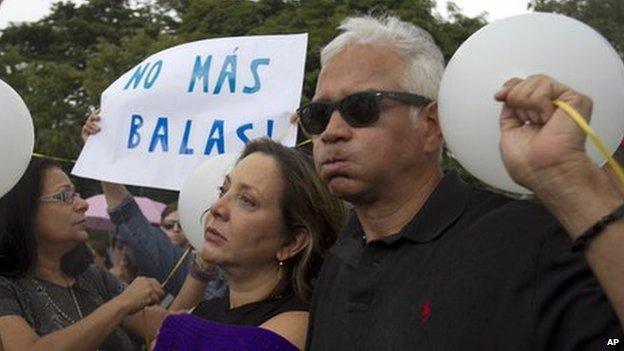
Venezuelan Actress Elba Escobar and her husband Francisco Oilvares were among those who rallied in Caracas on Wednesday to demand more be done to fight crime.
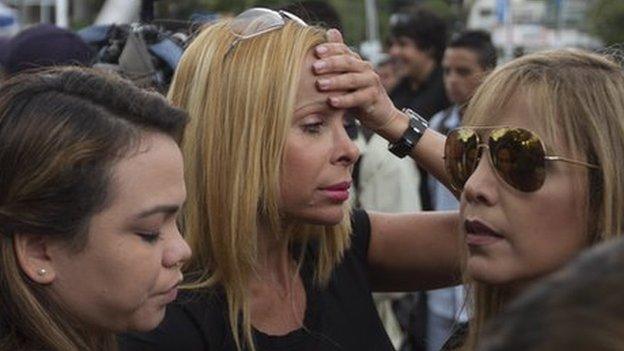
TV presenter Shia Bertoni joined a protest against the murder of Monica Spear
Rich vs poor
Those who can afford it hire bodyguards for a night or fit their cars with armour to withstand the impact of bullets.
Houses in the richer areas are surrounded by electric security fences and have private guards.
But changing habits to adapt to the increasing risks is a privilege of the middle and upper classes, says Roberto Briceno, director of the OVV.
"Poorer people don't have these options. They still have to travel to work and back by public transport, and there are many victims," he says.
He says that 83% of murder victims are from the lower classes, and live in poorer neighbourhoods.
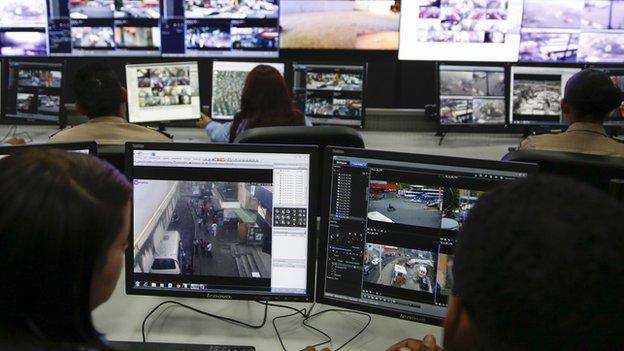
President Maduro hopes a new surveillance system will help bring down crime rates in Venezuela
Changing habits
Osea Lombardi, a psychoanalyst, says that anxiety and fear are common in Caracas, and many try to close their eyes to the danger in order to keep living their lives as normally as possible.
"Life has quietly changed. Nobody is out in the streets at night. Parents are afraid for their children who go out," she says.
But at the same time, Ms Lombardi herself says she has not changed her habits much.
"I still hold meetings at night. I haven't changed my life. I think one needs to accept this as one would accept the possible risks of a war zone."
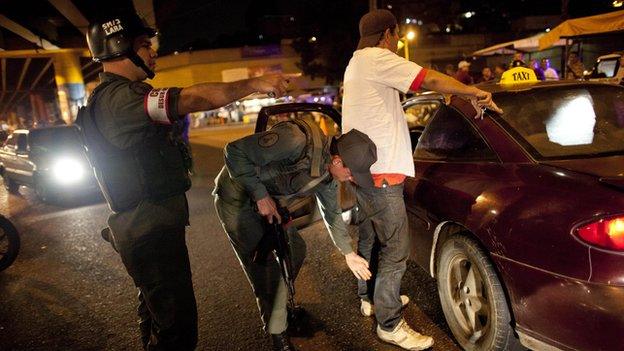
Petare is one of the most dangerous neighbourhoods in Caracas
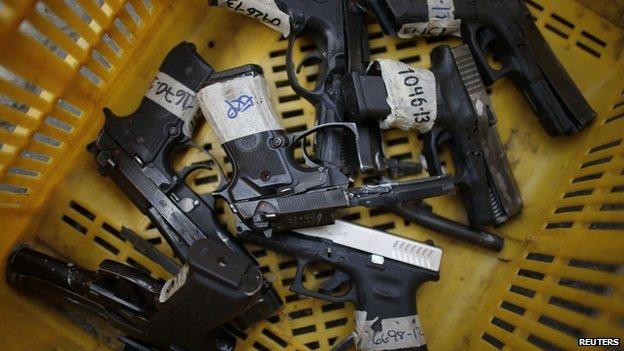
A great number of illegal weapons are in circulation in the country
"Maybe I should change, but in some way we need to keep living," she adds.
Mr Subero agrees.
He is the co-founder of a group called Runners Venezuela that organises night-time jogs in the wealthy district of Chacao. The group was founded three years ago, following a spate of kidnappings.
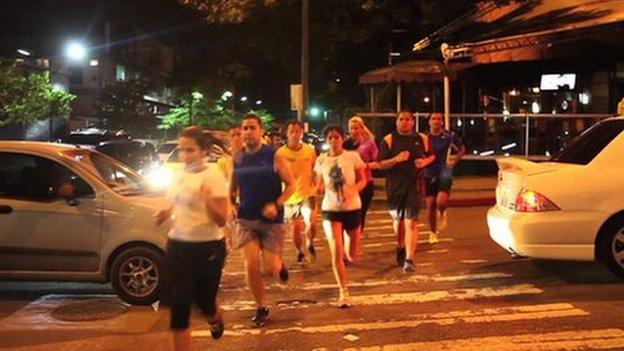
Running groups have been set up in Caracas for safety reasons
"Running at night was becoming difficult because the streets were dangerous," he says. "But now we can exercise in a group safely."
Following Ms Spear's murder, President Maduro has promised to draft a "pacification law" to reduce the number of firearms in private hands.
But Ms Spear's murder also showed how dangerous certain relatively innocuous activities, such as driving at night on a motorway, can be.
"Her death highlights that we are all subject to the danger of murder," says Mr Briceno.
"This may be the straw that breaks the camel's back," he said.
- Published8 January 2014
- Published5 July 2013
- Published28 December 2011